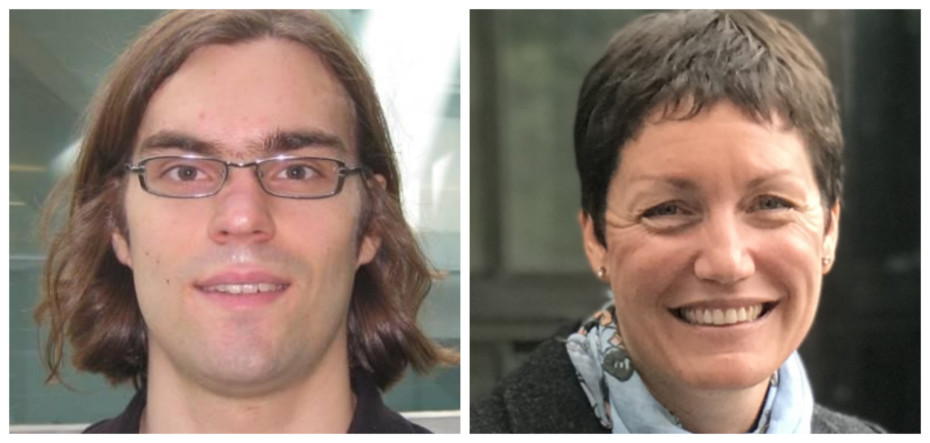
Professors Daryl Haggard and Simon Caron-Huot of the Department of Physics have been honoured by the Breakthrough Prize Foundation for their contribution to the field Physics – with Professor Haggard as a joint-recipient of the Breakthrough Prize in Fundamental Physics and Professor Caron-Huot the New Horizons in Physics Prize.
Established in 2011, the Breakthrough Prize, also known as the “Oscars of Science,” has grown quickly in terms of its international prominence due to its generous awards, with this year’s prizes totaling over $21 million. With the backing of several key technology trailblazers including Priscilla Chan and Mark Zuckerberg, Ma Huateng, Yuri and Julia Milner, the prize recognizes the worlds’ top scientists in the fields of Life Sciences (up to four per year), Fundamental Physics (one per year) and Mathematics (one per year).
In addition, up to three New Horizons in Physics and up to three New Horizons in Mathematics Prizes are given out to junior researchers each year. Laureates will attend a televised award ceremony on November 3 to celebrate their achievements and inspire the next generation of scientists. The ceremony will be broadcast live on National Geographic.
“Well-deserved recognition”
Haggard received the 2020 Breakthrough Prize in Fundamental Physics as a part of the 347-member Event Horizon Telescope (EHT) Collaboration Team that received this award for capturing the first image of a supermassive black hole, taken by means of an Earth-sized alliance of telescopes. The prize recognizes individuals or teams who have made profound contributions to human knowledge.
Caron-Huot received the 2020 New Horizons in Physics Prize for his profound contributions to the understanding of quantum field theory. Each year, the New Horizons in Physics Prize are awarded to three promising junior researchers who have already produced important work.
“These prestigious awards shine a spotlight on McGill’s outstanding researchers in the field of Physics, who are effectively contributing to the world’s most impactful discoveries, like capturing the first image of a black hole or providing profound contributions to the understanding quantum field theory,” said Martha Crago, Vice-Principal, Research and Innovation. “Congratulations to Professors Daryl Haggard and Simon Caron-Huot for this well-deserved recognition.”
Capturing the first Image of a black hole
Haggard is an Assistant Professor in the Department of Physics and the McGill Space Institute, and a Canada Research Chair (Tier 2) in Multi-messenger Astrophysics. She is an observational astronomer who explores the interplay between growing supermassive black holes (SMBHs) and their host galaxies, and who chases electromagnetic counterparts to gravitational wave sources. She is also a CIFAR Azrieli Global Scholar and a member of CIFAR’s Gravity and the Extreme Universe Program.
As a member of the EHT’s Multi-wavelength Science Working Group, she contributed to the paradigm-shifting observations of the gargantuan black hole at the heart of distant galaxy Messier 87 – its mass equivalent to 6.5 billion suns – in April 2019. The global collaboration of scientists, scattered among 60 institutions, used eight sensitive radio telescopes strategically positioned around the world in Antarctica, Chile, Mexico, Hawaii, Arizona and Spain, to capture the very first image recorded of a black hole.
By synchronizing each telescope using a network of atomic clocks, the EHT team created a virtual telescope as large as the Earth, with a resolving power never before achieved from the surface of our planet. After painstakingly analyzing the data with novel algorithms and techniques, the team produced an image of this galactic monster, silhouetted against hot gas swirling around the black hole, that matched expectations from Einstein’s theory of gravity: a bright ring marking the point where light orbits the black hole, surrounding a dark region where light cannot escape the black hole’s gravitational pull.
“The EHT has given us a beautiful image of an awesome black hole,” said Haggard. “I am incredibly proud of this M87 discovery and honoured to be a part of the team awarded the 2020 Breakthrough Prize.”
Quantum field theory
Caron-Huot is an Assistant Professor in the Department of Physics and Canada Research Chair (Tier 2) in High-Energy Physics. He was awarded the 2020 New Horizons in Physics Prize for his profound contributions to the understanding of quantum field theory. He works in high-energy particle theory, a branch of physics that studies the nature of the particles that constitute matter and radiation. In particular, he studies scattering amplitudes in the theory of the strong force, quantum chromodynamics, where he develops techniques to simplify and enable new calculations. These techniques harness the surprising power of general principles: relativity and quantum mechanics, to break difficult quantitative calculations into simpler building blocks.
